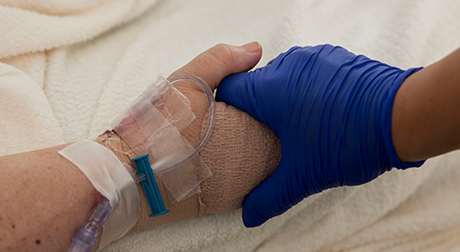Hand Hygiene
 Hand washing is one of the most effective ways to prevent the spread of infection and is the professional responsibility of all health care workers. When you are at Cooper, feel free to ask our staff if they have sanitized their hands with soap and water or alcohol gel before touching you. Also, remember to wash your own hands to prevent the spread of harmful germs.
Hand washing is one of the most effective ways to prevent the spread of infection and is the professional responsibility of all health care workers. When you are at Cooper, feel free to ask our staff if they have sanitized their hands with soap and water or alcohol gel before touching you. Also, remember to wash your own hands to prevent the spread of harmful germs.
Click here to learn more about hand hygiene, including the right way to wash your hands.
Click here to learn more about infection prevention and how you can help prevent infections.
Consent Forms
Consent forms are your agreement to let our staff treat you; they are signed by all patients at the time of admission. A parent or guardian must sign for minors or those unable to sign for themselves. Other consent forms, signed at the time of admission, concern insurance coverage. Additional forms may be required for special procedures during hospitalization. Your physician will discuss these with you.
Identification Band
For your protection, we ask that you wear an ID band at all times until you are discharged. If the information on the band is wrong, or if the band should fall off or be removed for any reason, please be sure to tell your nurse.
Fire & Disaster Drills
State regulations require that hospitals conduct periodic fire and disaster drills. Do not be disturbed if you see or hear a practice drill in progress. You will receive instructions from hospital personnel in the event of an actual emergency.
Preventing Falls
Surroundings that are unfamiliar to you and the stress related to a hospital stay, along with medication use, can increase your risk for falling. To help avoid falls, we suggest the following:
- Be sure objects you need are within reach – such as the call bell, bedside table, and telephone.
- Use your call button if you need help or feel dizzy, light-headed, or weak. Wait for the nurse to help you.
- Do not try to climb over or put down the side rails of your bed.
- Wear slippers with non-skid soles.
- Do not lean on objects with wheels such as IV poles or your bedside table.
- Call the nurse if a spill occurs on the floor.
- Use assistive devices such as a walker or cane, or the handrails in the bathroom or hallway.
- Patient Lifts are assistive devices that allow patients who have lost or limited mobility to be transferred between their bed, chair, or other resting place. These devices use hydraulic power and straps, slings, or belts to make the transition possible.
- For information about home fall prevention, speak with your nurse or physician.
Preventing Medical Identity Theft
Medical identity theft occurs when someone uses a person’s name or other parts of his/her identity (health insurance information, Social Security Number) to obtain medical services or goods, or when someone uses the person’s identity to obtain money by falsifying claims for medical services and falsifying medical records to support those claims. There are several things you can do to minimize your risk of medical identity theft.
While at the hospital, especially for an inpatient stay:
- Do not bring credit cards into the hospital.
- Avoid carrying important documents with you.
- Empty your wallet or purse of unnecessary items.
- Whenever possible, have a family member take care of bills at home; do not bring or leave medical bills in the hospital room.
- Request the hospital to use a medical record number instead of your Social Security number for identification purposes.
- Don’t be afraid to ask questions, such as who will be able to access your information.
When at home:
- Review every Explanation of Benefits letter you receive from your insurance company. Check to make sure you received the services described.
- Always inform your insurance company of a lost or stolen insurance card.
- If you suspect that you are a victim of medical identity theft, request a copy of your medical records to ensure you are the only person who has been provided service under your name.
If you are the victim of medical identity theft:
- File a police report through your local police department.
- File a medical identity theft complaint with the Federal Trade Commission at www.identitytheft.gov or by calling 1.877.IDTHEFT.
